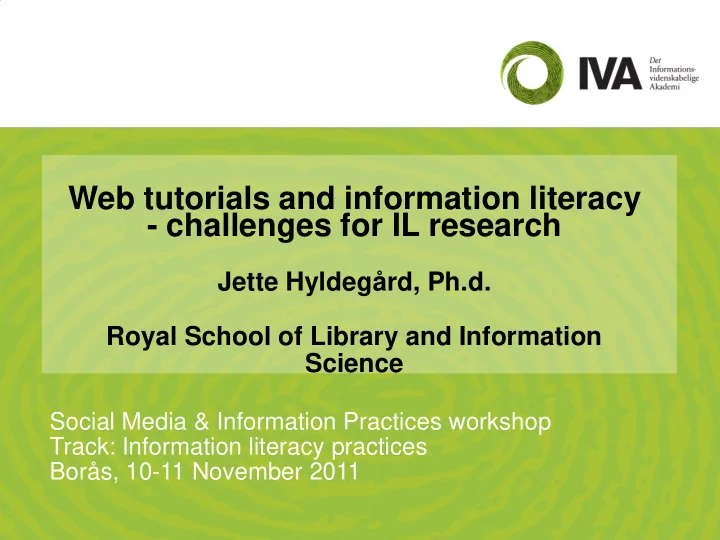

Web tutorials and information literacy - challenges for IL research Jette Hyldegård, Ph.d. Royal School of Library and Information Science Social Media & Information Practices workshop Track: Information literacy practices Borås, 10-11 November 2011
Background - 3 recent research projects A research project (2010-2011) evaluating three Norwegian IL web tutorials An exploratory study (in 2009) of secondary school pupils’ information behaviour A longitudinal case study (in 2002 and 2004-2005) on group members’ information behaviour during an assignment process.
Introduction Many myths about the digital natives’ behaviour A critical educational backlog exists with regard to IL In a higher education context How should Information Literacy be taught, practiced, motivated and supported in a study practice?
IL web tutorials the answer?
IL web tutorials Platform for guiding seeking, research and writing Platform for developing IL knowledge and skills Often stand-alone (offline) Only minor attention is paid to social media and internet searching Focus is often on the individual information seeker
Constraints to IL web tutorials No motivation for studying the essence of good information practice Discrepancy between intentions and actual behaviour Offline tool vs online behaviour Requirements from faculty and domain have a strong impact on students’ information behaviour Students’ preferences and needs differ The positive expectations of IL web tutorials may have been overrated by the developers.
Reconsidering the IL web tutorial for Higher Education Web tutorials as ‘genre’ the proper design format for IL? What perspective (tool, process etc.) should be built in a web tutorial to support students’ information behaviour and study practice? Who should create the content? The library, students, faculty, others? How may web tutorials be integrated in students’ social practice (and study practice) to stimulate their critical thinking and facilitate their IL competencies in association with seeking, research , group work and writing? How should the effect of IL web tutorials in context be measured and evaluated?
General IL research issues What constitutes IL and how does the concept relates to other concepts such as digital fluency? How is the concept perceived, e.g. by students, academic staff and policy makers? To many it is still an isolated, stand-alone or add-on activity associated primarily with the library rather than an integrated activity of high importance for knowledge creation. Analytical models such as Sundin’s model (2008) should be further explored IL research should be strengthened through an interdisciplinary approach involving researchers outside the library and information science community. Research should be disseminated and discussed outside the LIS community as well.
References Hyldegård, J.; Lund, H.; Moring, C.; Pors, N.O. and Schreiber, T. (2011). Studerende, læring og webtutorials : En analyse af 3 norske læringssystemer. København: Det Informationsvidenskabelige Akademi. 150 p. Hyldegård, J. (2010). Between myths and reality – an exploratory study of secondary school pupils’ information behaviour. Creating Knowledge 2010, 8-10 September 2010, Bergen, Norway. 14 p. Hyldegård, J. (2009). Beyond the search process: Exploring group members' information behaviour in context. I nformation Processing & Management .,45(1), p. 142-158. Sundin, O. (2008). Negotiations on information-seeking expertice – a study of web-based tutorials for information literacy. JDOC , 64(1), 24- 44.
Recommend
More recommend